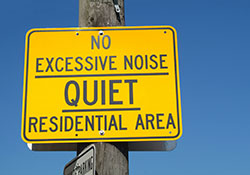Data and statistics

iStockphoto
Noise is an underestimated threat that can cause a number of short- and long-term health problems, such as for example sleep disturbance, cardiovascular effects, poorer work and school performance, hearing impairment, etc.
Noise has emerged as a leading environmental nuisance in the WHO European Region, and the public complains about excessive noise more and more often.
How loud is too loud?
The WHO guidelines for community noise recommend less than 30 A-weighted decibels (dB(A)) in bedrooms during the night for a sleep of good quality and less than 35 dB(A) in classrooms to allow good teaching and learning conditions.
The WHO guidelines for night noise recommend less than 40 dB(A) of annual average (Lnight) outside of bedrooms to prevent adverse health effects from night noise.
How many people are affected?
According to a European Union (EU) publication:
- about 40% of the population in EU countries is exposed to road traffic noise at levels exceeding 55 db(A);
- 20% is exposed to levels exceeding 65 dB(A) during the daytime; and
- more than 30% is exposed to levels exceeding 55 dB(A) at night.
Only limited international figures are available on the health impact of environmental noise in the European Region. WHO/Europe published preliminary estimates in 2011.
Who is most affected?
Some groups are more vulnerable to noise. As children spend more time in bed than adults, they are more exposed to night noise. Chronically ill and elderly people are more sensitive to disturbance. Shift workers are at increased risk because their sleep structure is under stress. In addition, the less affluent who cannot afford to live in quiet residential areas or have adequately insulated homes, are likely to suffer disproportionately.
Nuisance at night can lead to an increase in medical visits and spending on sleeping pills, which affects families’ budgets and countries’ health expenditure. The gap between rich and poor is likely to increase if governments fail to address noise pollution.
Children, noise and health
Impairment of early childhood development and education caused by noise may have lifelong effects on academic achievement and health. Studies and statistics on the effects of chronic exposure to aircraft noise on children have found:
- consistent evidence that noise exposure harms cognitive performance;
- consistent association with impaired well-being and motivation to a slightly more limited extent;
- moderate evidence of effects on blood pressure and catecholamine hormone secretion.



